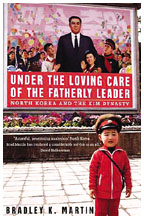February 23, 2005: Reading Room
Mind
control
Bradley K. Martin ’64 explores the Kim dynasty
By Louis Jacobson ’92
Bradley K. Martin ’64: “I wanted readers to have a sense of individual people in North Korea.” (Palani Mohan) |
When Bradley K. Martin ’64 was at Princeton, virtually everything he read in Time and Newsweek about the war in Vietnam suggested that the United States was winning. But then Martin joined the Peace Corps in Thailand, and “it took me three weeks ... to realize what I’d been reading was wrong,” Martin recalls. “I had never even considered journalism as a career. But ... I thought, ‘I can do better than that.’ ”
After his Peace Corps commitment ended, Martin, a history major, returned to the United States to climb the journalism ladder. In 1977, he went back to Asia as Tokyo bureau chief for the Baltimore Sun, and he’s spent most of the past quarter-century in Asia. Martin’s specialty became the Korean peninsula — an expertise that led to his book, Under the Loving Care of the Fatherly Leader: North Korea and the Kim Dynasty, published by Thomas Dunne Books in October.
 Martin’s
tome tells the story of the reclusive nation ruled with an extraordinary
degree of control first by Kim Il-Sung, who ascended to power in 1948,
and then by his son Kim Jong-Il, who took over upon his father’s
death in 1994. The volume punctuates the reports of defectors, academics,
and diplomats with on-site reporting by Martin. Though North Korea is
largely off-limits to Western journalists, Martin has made four visits.
He was invited on the rare occasions when the government did let in foreign
journalists. “I wanted readers to have a sense of individual people
in North Korea and how they live in a society that, by our standards,
is so very strange and bizarre,” says Martin, a visiting journalism
professor at Louisiana State University.
Martin’s
tome tells the story of the reclusive nation ruled with an extraordinary
degree of control first by Kim Il-Sung, who ascended to power in 1948,
and then by his son Kim Jong-Il, who took over upon his father’s
death in 1994. The volume punctuates the reports of defectors, academics,
and diplomats with on-site reporting by Martin. Though North Korea is
largely off-limits to Western journalists, Martin has made four visits.
He was invited on the rare occasions when the government did let in foreign
journalists. “I wanted readers to have a sense of individual people
in North Korea and how they live in a society that, by our standards,
is so very strange and bizarre,” says Martin, a visiting journalism
professor at Louisiana State University.
During his 1992 trip, Martin was riding a special train for government officials and their guests when he saw a public-transit train moving in the opposite direction. It was a sight that his tightly controlling government “minders” had never intended him to see: “Everybody looked like they were either covered in mud or had a skin disease. I learned later that trains in North Korea had little fuel, so they would take days to go short distances. There was no water on the train. People couldn’t wash.”
In addition to the nation’s deprivation and the existence of grim forced-labor camps, the defining characteristic of North Korea is its degree of mind control, Martin says. For more than 50 years, North Korea has practiced political and social indoctrination. Children are effectively raised by the state and are taught to revere their leaders as virtual deities. The indoctrination continues through adulthood, reinforced by tight restrictions on information.
Kim Jong-Il is best known in the West for his determination to build
a nuclear bomb and his odd pompadour. These traits generally have cast
him as a loose cannon. But Martin calls this characterization misguided.
He sees Kim Jong-Il as smart, but constrained by his father’s cultish
legacy. For Kim Jong-Il to admit that his father was wrong on economic
policy, Martin argues, risks imploding the foundation of his society.
![]()
Louis Jacobson ’92 is deputy editor of Roll Call, a newspaper covering Congress.
Book Shorts
 The United States of Europe: The New Superpower and the End of American
Supremacy — T.R. Reid ’66 (Penguin Press). The author
argues that the European Union, not the United States, is emerging as
the new superpower. Reid traces the rise of European unification in the
wake of World War II Europe and its development into an economic, political,
and cultural force — the EU. Reid is Rocky Mountain bureau chief
for the Washington Post.
The United States of Europe: The New Superpower and the End of American
Supremacy — T.R. Reid ’66 (Penguin Press). The author
argues that the European Union, not the United States, is emerging as
the new superpower. Reid traces the rise of European unification in the
wake of World War II Europe and its development into an economic, political,
and cultural force — the EU. Reid is Rocky Mountain bureau chief
for the Washington Post.
 How to Care for Aging Parents — Virginia Morris ’81
(Workman). This second edition of an A-to-Z guide for adult children caring
for aging parents covers the emotional, legal, financial, medical, and
logistical issues involved. The book’s appendix includes lists of
national organizations, including the AARP, Family Caregiver Alliance,
and state Medicaid offices. A journalist, Morris also authored Talking
About Death Won’t Kill You (2001).
How to Care for Aging Parents — Virginia Morris ’81
(Workman). This second edition of an A-to-Z guide for adult children caring
for aging parents covers the emotional, legal, financial, medical, and
logistical issues involved. The book’s appendix includes lists of
national organizations, including the AARP, Family Caregiver Alliance,
and state Medicaid offices. A journalist, Morris also authored Talking
About Death Won’t Kill You (2001).
 An Anthology of Russian Literature from Earliest Writings to Modern Fiction:
Introduction to a Culture — edited by Nicholas Rzhevsky
*72 (M.E. Sharpe). This anthology of tales, stories, poems, plays, and
excerpts from novels offers an introduction to Russian literature. The
book comes with a multimedia CD-ROM. Rzhevsky is chairman of the department
of European languages, literatures, and cultures at Stony Brook University.
An Anthology of Russian Literature from Earliest Writings to Modern Fiction:
Introduction to a Culture — edited by Nicholas Rzhevsky
*72 (M.E. Sharpe). This anthology of tales, stories, poems, plays, and
excerpts from novels offers an introduction to Russian literature. The
book comes with a multimedia CD-ROM. Rzhevsky is chairman of the department
of European languages, literatures, and cultures at Stony Brook University.
![]()
By K.F.G.
For a complete list of books received, click here.
Have an opinion about this issue of PAW? Please take a minute to click here and fill out our online questionnaire. It’s an easy way to let the editors know what you like and dislike, and how you think PAW might do better. |

